- Home
- Stephen L Carter
Palace Council Page 7
Palace Council Read online
Page 7
“But our duty to honor our mother and father,” she shot back, “does not end just because we grow up. Marcie owes Mom the same duty of obedience that Mom owes you,” Junie finished, although she believed in neither. Smiling sweetly, she told the shocked assemblage what she had learned in a legal-history class, that in some of the colonial towns disobeying one’s father had been a felony, punishable by flogging or worse.
“I should have been alive then,” the pastor rumbled, struggling to lighten the mood.
“You would have loved it,” Junie agreed, which won her a dramatic rolling of fatherly eyes.
Marie announced dessert.
(II)
AFTER DINNER, Junie decided to skip church and return to Cambridge. The family was stunned. Nobody, not even Eddie, had ever dared do such a thing. But neither orders nor entreaties swayed her. Her brother walked her to the train. A fluffy early-evening snow dressed the sidewalks in cotton batting. The two of them kicked at shallow drifts and giggled as they had in the old days. Eddie told Junie about finding Philmont Castle’s body, and about seeing the cross around Margot’s neck, two secrets he had shared with no one else.
“That sounds pretty terrible,” Junie said, and shivered. “Finding the body.”
“It was.”
Then she laughed, and touched his face delicately, the way she used to when they were children, the only gentle member of a tough, frosty family. “You certainly lead an interesting life,” she said.
“That’s one way to look at it.”
“It’s funny about you finding Phil’s body.”
Eddie caught something in her tone. “Why is it funny?”
“Why you? Do you believe in coincidence?”
“If the alternatives are conspiracy and God’s will, yes, I generally do.”
“Draw it.” She rummaged in her purse, found paper and a pencil. “The cross.”
He did, and handed it back.
Junie frowned over the drawing, then popped the page into her bag. “I’ll ask around.” She saw his expression. “It’s Hah-vahd, my dear. Somebody will know.”
They stopped to watch a band of carolers drifting from house to house through the snow. Warm childhood memory rose in them both. Then the carolers strolled off in one direction, Eddie and Junie in the other.
“Sis?”
“Hmmm?”
“Why did you call him by his first name before? Castle?”
A sad smile. “Perry knows him pretty well. Knew him. He used to talk about him a lot.” Junie glanced at her brother. “Perry Mount. Remember him?”
“I remember you danced at Aurie’s wedding,” said Eddie neutrally.
“Well, Perry’s at Harvard now, doing international relations. He thinks you don’t like him, Eddie.” Eyes soft. “He’s so sweet. Remember how we used to play with him on the Vineyard before the war?”
“I remember that, the games he wanted to play, neither one of you was old enough for.”
“Well, I never played back,” she said tartly, and fell suddenly silent. After another block she said: “Do you really think it’s hopeless?”
“Do I think what’s hopeless?”
“What you were saying at dinner. Our situation. The darker nation.” The pixie grin came and went. “Your novel is so depressing, Eddie. Like there isn’t any hope. I don’t know, bro. I went to law school because I want law to make a difference, and maybe it will, but—well, maybe it won’t.”
Eddie hugged her. “What brought this on?”
“I don’t want to waste my life.”
“Is being a lawyer a waste?”
“It is if you can’t make people stop and listen.”
Eddie considered. It was unlike Junie to seek reassurance. “The world will change, sis. We might have to push and tug. But it’s going to change.”
“Even if we have to lift the world by its ears,” she murmured, eyes on the middle distance.
“Sounds painful.”
“Maybe it will be. Sometimes only pain makes people pay attention.”
“I thought you were going to be President.” To his surprise, his sister failed to smile. He glanced at her face. She looked miserable. They walked in silence for a few minutes. At the entrance to the subway, Junie kissed his cheek and then, suddenly weepy, told him she was pregnant.
“Who’s the lucky man?” he asked, hugging her, too bewildered to think of kind words instead of clever. His own troubles were knocked right out of his head.
“You don’t wanna know.”
“But I do.”
“Nobody. Somebody.”
“Not Perry.”
“Yuch. No.” A sad grin, and Eddie remembered the old days on the Vineyard, how the children used to sit in the backyard reading Shakespeare aloud, Junie as Miranda in The Tempest, poor Perry as her hapless suitor. “One of my professors,” she said.
Eddie put his hands on his sister’s shoulders and held her at arm’s length. Her broad face was stricken and wan. Pointy snowflakes stood out crisply on her curly black hair before vanishing. Eddie’s world consisted of two sorts of people: those with whom he competed for accolades and achievements, and his little sister. “You’re not joking, are you?”
“No.” A slow sniffle. “The bastard says it isn’t his. But I haven’t been with anybody else.”
“Is he…Caucasian?”
A sneer bared perfect white teeth. “So far that’s the only kind they have down there.”
Ever practical. “You can’t be a law clerk and have a baby.”
“I know.”
“Who else knows about this?”
“Nobody. Not unless he told somebody.”
“There’s a woman I know who could—”
Junie shoved free of him and put both hands over her stomach. She looked wintry and strong. “I am not killing my baby, Eddie. No way.”
“You’re not thinking, sis.”
“Yes, I am, Eddie. I am. Killing is wrong.” She puffed out a lot of air. “But pain—”
She stopped. Shook her head.
“Sis?”
Without moving, she increased the distance between them. “Thanks, brother. For everything. I’ll let you know when I find out about the cross.” When—not if. That was his sister. About to say more, Junie turned and hurried down the steps. Eddie walked to the crowded church, where the congregation celebrated the birth of one baby and he pondered the fate of another.
Two months later, he was picked up by federal agents.
CHAPTER 8
The Coal Truck
(I)
BERNARD STILWELL CAME into Eddie’s life in February of 1957, by which time literary circles had been buzzing for a year; and, like the acclaim, Stilwell never quite left. Eddie in time would grow accustomed to the flair for melodrama that accompanied their first meeting. He was eating breakfast at the counter in the Chock full o’ Nuts shop next to the Theresa Hotel, leafing through complimentary letters, when Stilwell and a fellow agent of the Federal Bureau of Investigation materialized on either side of him, flashing badges where only Eddie could see, then frog-marching him to a waiting sedan driven by a third man, who zoomed off almost before the doors were closed. Stilwell sat beside him in the back. The other agent joined the driver.
“How are you, Eddie?”
“What?”
Stilwell had sleepy hunter’s eyes, and arched wispy blond brows. The pupils were very dark. It was easy to imagine him capering through Hell—one of the tormentors, not the tormented. “Famous writer like you. Must be nice, huh?”
The car headed north along the Hudson, then cut east. Eddie was bewildered. Unlike most of the Negro intelligentsia of his day, he never envisioned the government as a force, whether benevolent or malign. He hardly thought of government at all. He was too busy writing. “What do you want?”
“An autograph.”
“A what?” said Eddie, thinking, absurdly, of Aurelia’s promise.
“Autograph.” The agent pulled a soiled copy o
f Field’s Unified Theory from somewhere. “I’m a big fan.”
“I beg your pardon.”
“Nice little story. Very realistic. Do a lot of research, did you?”
Confusion replaced whatever else Eddie might have been feeling. He had assumed they would ask about the long-ago days working for Scarlett, and had been setting out a whole army of evasions and lies to defend himself. Perhaps they even knew he was the one who had found Castle’s body. But now his dispositions were useless.
“I don’t know what you mean. Research?”
“For your story. This Dyson Field. Nice name. Talk to him at all?”
Eddie laughed uneasily. Somebody’s idea of a joke. “He’s a character. It’s a novel.” No response, from either Stilwell or the men in the front. Eddie glanced out the window. They were proceeding slowly through the traffic on Seventh Avenue, at about the speed of the many parades that graced the wide, divided boulevard in good weather, as one or another colored men’s or women’s civic organization, all decked out in ceremonial regalia, marched forth to show the world that Jim Crow had defeated neither unity nor beauty. “I made him up,” Eddie explained, wondering why he was not getting through. “Dyson Field. He’s an invention. No more.” The Caucasian faces disbelieved him. “Why? What’s wrong?” No response. Eddie climbed up on his high horse. “Why have you detained me?”
Bernard Stilwell laughed, and the sound was one Eddie wanted never to hear again, for, if the agent had a demon’s face, his laugh was the self-satisfied bray of the final betrayer in the lowest circle of Dante’s mad, brilliant vision of the afterlife. He clapped Eddie on the back hard enough to throw his head forward. Eddie clenched his fists and forced down his body’s instinctive response. This was, after all, the FBI.
“A lot of detail in the novel. A lot of the physics is right.”
“I would hope so.”
“You know any physics yourself?” The car had turned east onto a side street up in the 150s, but the driver was unfamiliar with the neighborhood. Now they were stuck behind a coal truck unloading into a basement chute, noise and dust obscuring sound and sight from outside the car. Stilwell did not raise his voice, and Eddie had to lean closer to hear. “Didn’t you start out as a physics major at Amherst? You switched, though, right?”
“What does my major have to do with—”
“This is more than freshman physics.” He handed Eddie the novel. “Field theory. Heisenberg’s principle. This isn’t F = ma. You had a source, didn’t you?”
“A what?”
“A source. For your story.” Tapping the curling pages. Many had been annotated in blue ink. “All this physics. All this about security. Somebody talked to you. You talked to somebody.”
Eddie sized up the federal agent, so scrawny that his pasty ankles showed above his white socks. His perpetual scowl emphasized fiery eyes. “May I see your credentials again?”
“Of course.” Casually, smiling, almost without looking, Stilwell lifted a languid hand. The next thing Eddie knew, the forearm was jammed into his neck, holding him tightly to the seat, while the other agent from the restaurant leaned from the front seat and grabbed his wrists, lest he try something stupid. The driver had the grace to look uneasy, but he kept his eyes forward.
“Did you have a source or not?” said Stilwell conversationally.
“Get off me!” cried Eddie, quite surprised.
“Your source, Eddie. Come on.”
“It’s a story, you half-witted son of a bitch! Let go!”
Instead, the agent pressed harder. “You know who I’m talking about, Eddie. I can’t prove it yet, but when I do, you’ll wish you’d told the truth.” Stilwell’s spluttery mouth was very close. “You’re a stupid little man, Eddie, and you always will be.” Just like that, the heavy arm was gone, and Eddie was leaning forward, choking for breath. “Didn’t you think we’d find out? Do you think we’re as stupid as you are?”
Eddie lifted a cautious head. “You’re crazy,” he wheezed. When Stilwell did not respond, Eddie was emboldened. “I’m going to turn you in.”
“For what?”
“Assault.”
“You assaulted me first. It was self-defense. I have two witnesses, both law-enforcement personnel. Who’s going to speak up for you, Eddie?”
The writer ground his teeth and kept his temper. The coal truck continued blocking their path, black dust sifting through the air as the coal ran down a wooden chute. Out on the sidewalk, Harlem strolled past, none of the few pedestrians in evidence paying attention to a Negro in a car being beaten by three Caucasians. It occurred to Eddie that his first guess was wrong: the driver had chosen a side street on purpose. “I’ll call the papers.”
“Ever read them?”
“Read what?”
“The newspapers. Specially from out of town.” The agent grinned, but only with his mouth. “Ever read them?”
He shrugged. “Sometimes.”
“New Mexico papers?”
“Not that I remember.”
Stilwell nodded. The driver had backed up and was executing a tight K-turn, nearly bumping a couple of parked cars. The other man in the front seat reached into his jacket, and Eddie tensed for blackjack or gun, but the agent only drew out a newspaper clipping, which he handed to Stilwell, who handed it to Eddie.
Eddie frowned, then looked closer.
The dateline was Los Alamos, New Mexico. One week ago.
NEGRO SCIENTIST IN SUICIDE
“What is this?”
“One Joseph Belt lost his security clearance after your novel came out.” He pointed to a photo in the corner. “Pretty redheaded wife, too, just like the one you made up.”
Eddie studied the page. In his fury over the suggestion of a link, he had missed the name completely. Belt. Joseph Belt. Physicist. Phil Castle’s friend who had met Eddie at the Savoy and refused to answer any of his questions.
Harlem’s own Doctor Belt had shot himself.
(II)
“NO,” Eddie said. He mopped his brow with a handkerchief as he read the two columns. Gunshot to head, despondent, drinking, marriage collapsing, rumored troubles on the job. First the Wall Street lawyer, now his Negro friend. Eddie said what he thought: “I don’t believe this.”
“You knew him.”
“I met him once in my life. I wanted to interview him for the paper.”
“And what secrets did he share with you?”
“Secrets?”
“About the nation’s security, Eddie.”
“I don’t know what you’re talking about. He didn’t tell me anything.”
That noxious laugh again. They had reached a Puerto Rican neighborhood. The car turned south once more. They were driving in an oval, roughly navigating the perimeter of Harlem. “Sure thing, Eddie.”
“I’m serious. I didn’t know he worked at”—a glance at the paper—“the Los Alamos National Laboratory. I never even heard of it.”
“No idea what they make there, right?”
“Actually, no.”
“Oppenheimer. Heard of him?”
Eddie shifted his weight. “Sure. Father of the H-bomb. You people railroaded him. Took his security clearance.”
“Had his due process first. A hearing. Buy the transcript at your local bookstore. Professor Belt testified in his favor. You didn’t know that, either, did you?” The agent did not wait for the answer. “Why did you pressure your publisher to get your book out so fast? Were you trying to help Belt?”
“Help him do what?” asked Eddie, who had simply wanted to impress his father, and the sooner, the better.
The spiteful eyes blazed. “Get the book out before we could stop him. Make our work harder. Was that your idea or his?”
Wesley Senior had a way of refusing to suffer fools. Eddie copied it now. He rolled his eyes and turned to look out the window. The morning was smoky, like a battlefield.
“Come on, Eddie. We know he was your source. You met with him a couple of years ag
o, at the Savoy. You spoke to him on the telephone both before and after that—”
Eddie’s whippet head came around. “What? I did not!”
“Eddie, Eddie.” Gently. “We’re not complete incompetents. All those late-night clandestine calls from bars in New Mexico to bars in Harlem. You think we don’t trace calls out of the base? With everything the Reds have been up to down there? You think we can’t dig up the bars where you hang out? Joseph Belt was your source, we got on to him, and he shot himself, just like in your novel. But you didn’t know anything about his work, did you? You have a magical power to make your stories come true. Or do you just see the future? Is that it, Eddie?”
Eddie felt cornered and did not even know how it had happened. “It’s a coincidence. That’s all.”
“One Negro physicist in the whole country with the right security clearance, and he commits suicide a couple of months after your novel comes out.” Stilwell was looking out the window at a barge on the choppy gray water. “After meeting you the previous year.” A shake of the head at the iniquity of men. “Wait! I know! It must be those nasty racists at the FBI making trouble for the Negroes again, right?”
“The thought had crossed my mind.”
“Yeah, well, relax, Eddie. You’re not important enough for us to waste time smearing you.”
Bristling, but not sure how to greet this insult, Eddie said, “Then to what do I owe the pleasure of your hospitality?”
“We have a deal for you. You tell us everything Doctor Belt told you about his work, you don’t write any more about national security, and we can maybe forget this little incident.” The voice remained casual, but the eyes bored in. “We live in dangerous times, Eddie.”
“He didn’t tell me anything about his work, Agent Stilwell. He refused to say a word. You can be very proud of him.”
“Are you mocking me?”
“Probably.”
Stilwell already had his elbow cocked, but the driver muttered something, and Eddie wondered whether they were playing good-cop, bad-cop, or if he had incorrectly guessed who was in charge. Outside, the fog was thickening instead of burning off.
“Know any of his friends?”

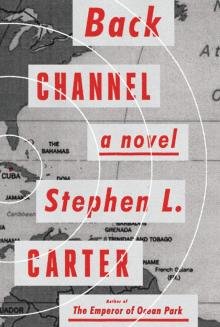 Back Channel
Back Channel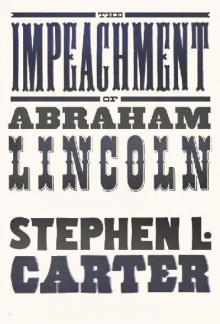 The Impeachment of Abraham Lincoln
The Impeachment of Abraham Lincoln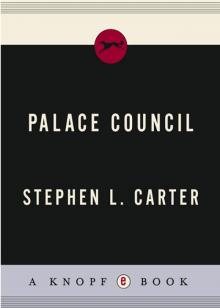 Palace Council
Palace Council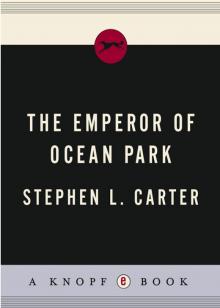 The Emperor of Ocean Park
The Emperor of Ocean Park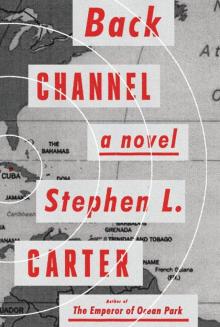 Back Channel: A novel
Back Channel: A novel Emperor of Ocean Park eh-1
Emperor of Ocean Park eh-1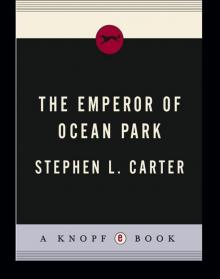 Emperor of Ocean Park
Emperor of Ocean Park